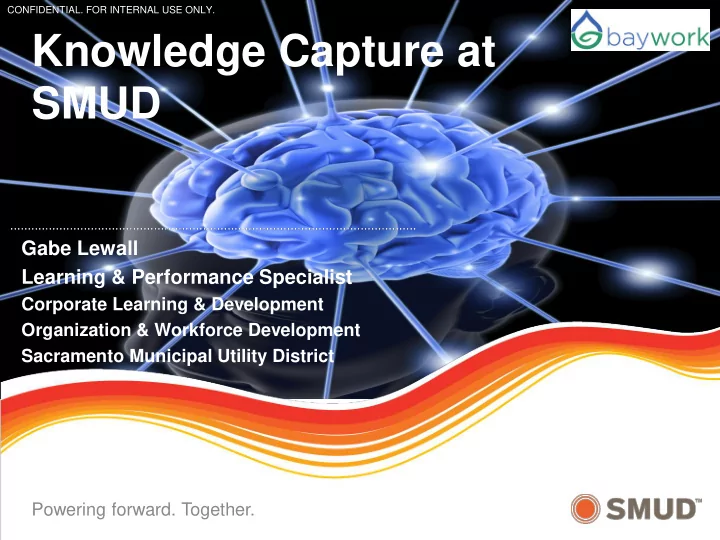

CONFIDENTIAL. FOR INTERNAL USE ONLY. Knowledge Capture at SMUD Gabe Lewall Learning & Performance Specialist Corporate Learning & Development Organization & Workforce Development Sacramento Municipal Utility District Powering forward. Together.
SMUD at a Glance • Nation’s 6 th -largest community-owned electric service provider • 50% of power from non-carbon-emitting sources • The first large California utility to receive more than 20% of its energy from renewable resources • For the 12th consecutive year, in 2014 SMUD was 1 st in California & 2 nd in the nation in the J.D. Power & Associates survey of residential customer satisfaction & 1 st in the nation among business customers. • 2,000 employees • 1.4 million residents in 900 square mile service territory
Challenges We have an aging workforce and face a significant brain drain. • Within the next 4 years, 46% of all SMUD employees will become eligible to retire. • 30% of SMUD managers are currently eligible to retire (55 or better + 5 yrs of service) – 22% have 19+ yrs of service • 27% of SMUD’s leads are currently eligible to retire. • 18% of SMUD area heads & 20% of leads are age 55+ and have 19 or more years of service • The average age for employees at SMUD is 46. • 15% of SMUD employees have one-of-a-kind job classifications (300).
SMUD’s Approach to KM Tacit Explicit Knowledge Knowledge • Knowledge • SharePoint ????? Capture Toolkit • EDM • Shared drives • Process maps • Training materials
Knowledge Capture Initiative • Initiative launched in 2009 Internal & Executive Company- External Sponsorship wide Rollout Research
SMUD’s Knowledge Capture Process
Knowledge Capture Initiative Management- driven Employee- driven
Management-Driven Process • Met with senior leaders in each business unit who identified individuals most at risk for loss of critical know-how using KC Toolkit • Followed up with key “at risk” individuals to step through remainder of KC Toolkit (2-3 mtgs)
Employee-Driven Option • Twice annually a half-day workshop is offered to employees at all levels that steps them through the KC Toolkit. Topics include: – Why bother – Barriers to knowledge capture – Matching knowledge capture tactics to knowledge types – SMUD’s Knowledge Capture Toolkit: Step by Step – Knowledge Retention Plan • Typically a roughly 50/50 mix between SMEs & Supervisors participate
Knowledge Capture Toolkit STEP 1: Complete Knowledge Loss Risk Assessment Purpose : Identify individuals at greatest risk of departing with critical/unique knowledge or skills. Who Completes Step: Management
Knowledge Capture Toolkit STEP 1: Knowledge Loss Risk Assessment Position Risk X Departure Risk = Total Risk (1-5 Rating) (1-5 Rating) Factor
What Knowledge to Capture? • For those with critical/key roles, should we capture everything they know / do?
Knowledge Capture Toolkit STEP 2: Complete Knowledge / Skill Criticality Assessment Purpose: Identify what knowledge / skill is most “at risk” Who Completes Step: SME, or SME + Supervisor
Knowledge Capture Toolkit STEP 2: Knowledge / Skill Criticality Assessment Ratings of: Importance X Rarity X Documentation (1-5) (1-5) (1-5)
Knowledge Capture Toolkit STEP 3: Create a Knowledge Retention Plan Purpose: Identify who will do what by when & current status . Who Completes Step: SME + Supervisor
Knowledge Capture Strategies • Knowledge Retention Plan template • Knowledge Capture Strategies Menu (30+ strategies) • Knowledge Capture Tactics in Depth intranet site • Knowledge Capture Interview Guide
Sample Knowledge Capture Tactics • After Action Review • Knowledge Capture Interview Guide • Communities of Practice • Storytelling • Job Shadowing • Desk Manuals
Resources for Deployment Staffing • Organization & Workforce Development Staff – Learning & Performance Specialists – Business Partners – Organization Effectiveness Specialist • Toolkits developed in-house Studies • Initial cost of contracted internal & external research studies
Outcomes • Consistent, structured process deployed company-wide • 60+ Knowledge Retention Plans created for critical “at risk” SMEs • Critical processes documented • Smoother transitions • Tools to address short & long-term needs
Challenges & Lessons Learned Challenges • Prioritization • Tracking Lessons Learned • It takes a village! • Beta test • Make it your own • Continuous improvement
Helpful Resources • CPS – www.cpshr.us • Tennessee Valley Authority - http://www.tva.gov/knowledgeretention/ • If Only We Knew What We Know • Lost Knowledge: Confronting the Threat of an Aging Workforce
Wrap Up • Questions? • Contact Info: Gabe Lewall Tel: 916.732.6094 Email: gabriel.lewall@smud.org
Recommend
More recommend